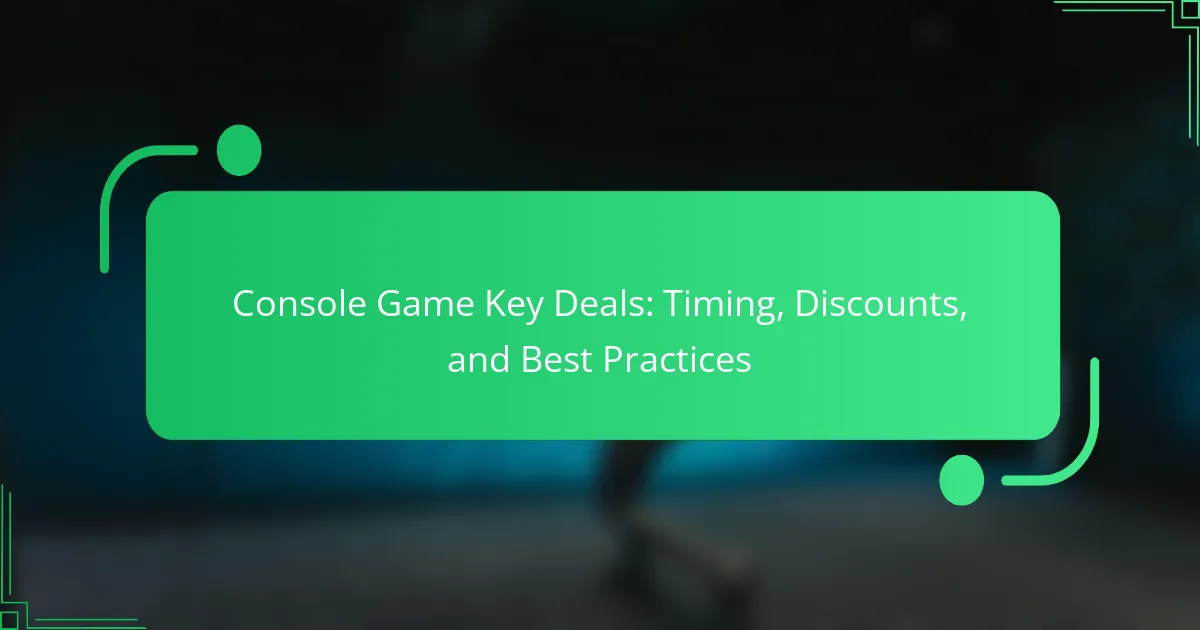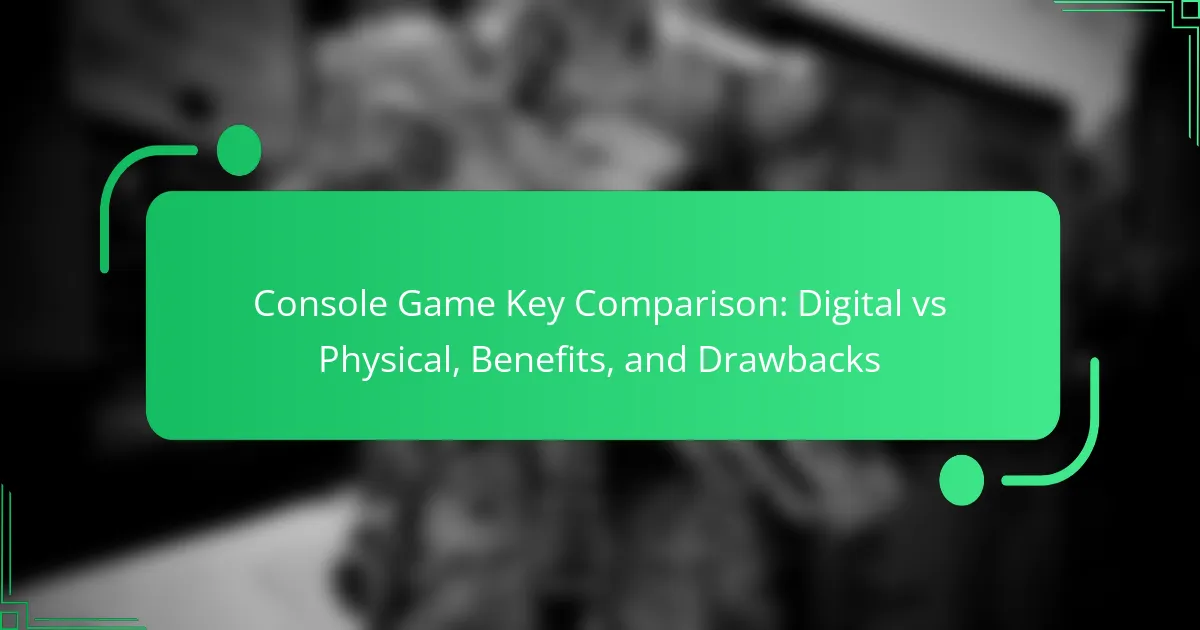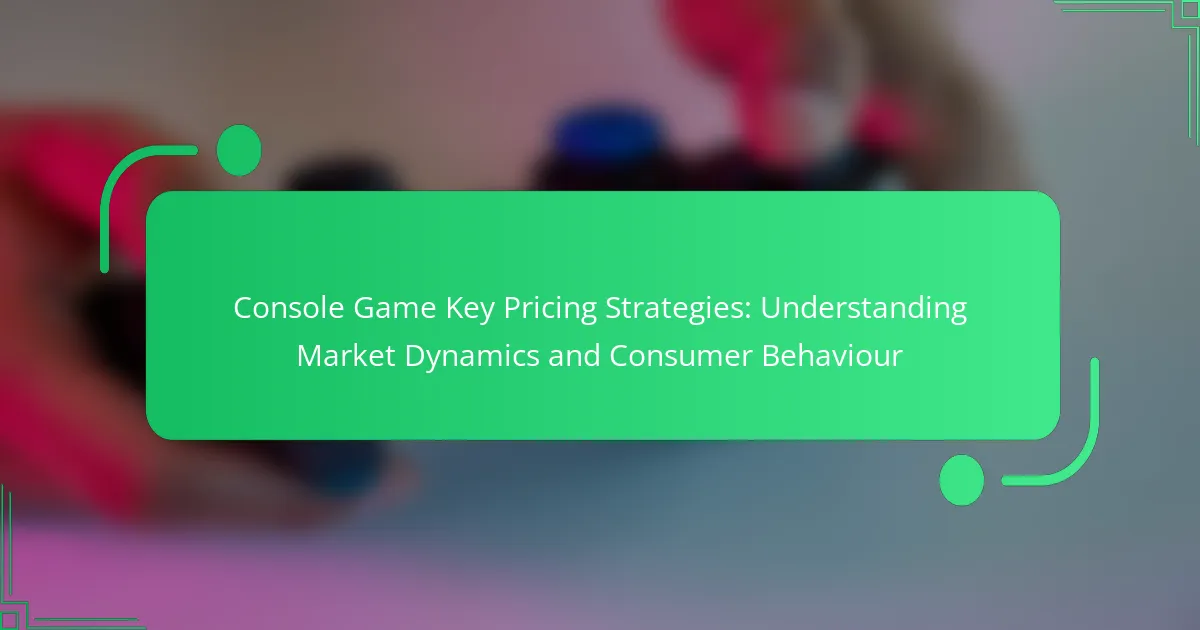The console game key marketplace offers competitive pricing and a diverse selection of titles, attracting budget-conscious gamers. Key players like Steam, GOG, and Humble Bundle shape the landscape with unique offerings. Consumers face challenges such as fraud and transparency issues. Understanding regional variations and emerging trends like subscription services is essential for navigating this evolving marketplace effectively.
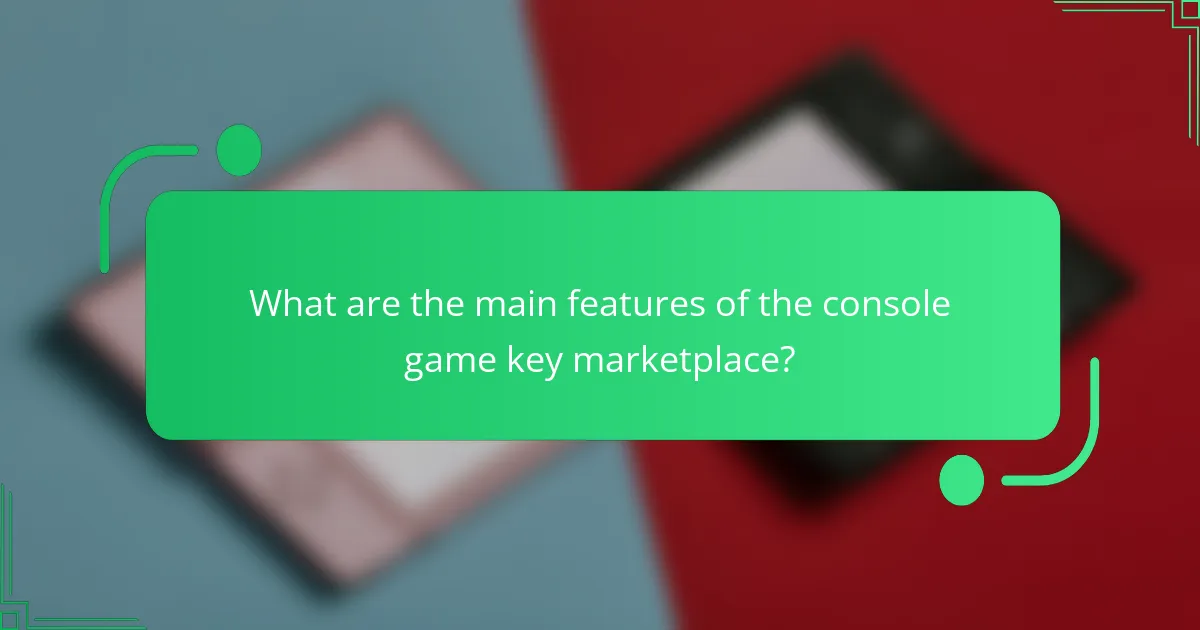
What are the main features of the console game key marketplace?
The main features of the console game key marketplace include competitive pricing, a wide selection of titles, and instant delivery options. These marketplaces often provide discounts on digital game keys, appealing to budget-conscious gamers. Additionally, user reviews and ratings help buyers make informed decisions. Security measures, such as buyer protection policies, enhance trust in transactions.
How does the marketplace function for buyers and sellers?
The marketplace for console game keys operates through a digital platform that connects buyers and sellers. Buyers browse listings, compare prices, and purchase keys, while sellers list their keys, set prices, and manage inventory. This system thrives on user ratings and feedback, ensuring trust and transparency. Additionally, the marketplace often features promotions and discounts, enhancing buyer engagement and driving sales for sellers.
What payment methods are commonly accepted?
Console game key marketplaces commonly accept credit cards, PayPal, cryptocurrency, and digital wallets. These payment methods ensure secure transactions and cater to diverse user preferences. Credit cards provide instant purchase capabilities, while PayPal offers buyer protection. Cryptocurrency appeals to tech-savvy users seeking anonymity. Digital wallets streamline the checkout process, enhancing user experience.
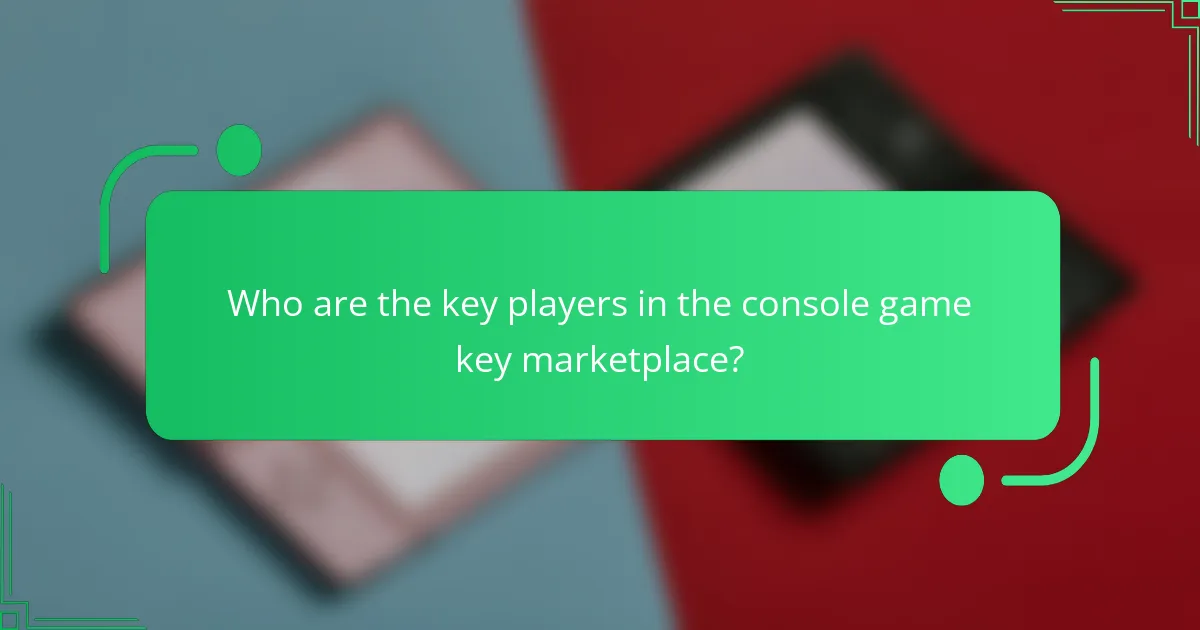
Who are the key players in the console game key marketplace?
The key players in the console game key marketplace include major digital distribution platforms. These platforms facilitate the buying and selling of game keys, offering competitive prices and a wide selection. Notable entities are Steam, GOG, Humble Bundle, and Green Man Gaming. Each platform has unique attributes, such as exclusive bundles or seasonal sales, which enhance their market presence. As the industry evolves, these players adapt to trends like subscription services and digital rights management.
Which platforms dominate the market landscape?
The console game key marketplace is primarily dominated by platforms such as Steam, Epic Games Store, and Green Man Gaming. These entities are recognized for their extensive libraries and competitive pricing. Steam leads with a vast selection and user base, while Epic Games Store attracts users with exclusive titles and free games. Green Man Gaming differentiates itself with discounts and promotional offers. Emerging platforms are also gaining traction, indicating a dynamic market landscape.
What role do third-party vendors play?
Third-party vendors play a crucial role in the console game key marketplace by facilitating transactions between consumers and game publishers. They often provide platforms that aggregate game keys, offering competitive pricing and diverse options. This enhances accessibility for gamers while allowing publishers to reach a broader audience. Additionally, these vendors can offer unique promotions and bundles that attract customers, contributing to market growth. Their influence shapes pricing strategies and consumer behavior, making them essential players in the ecosystem.
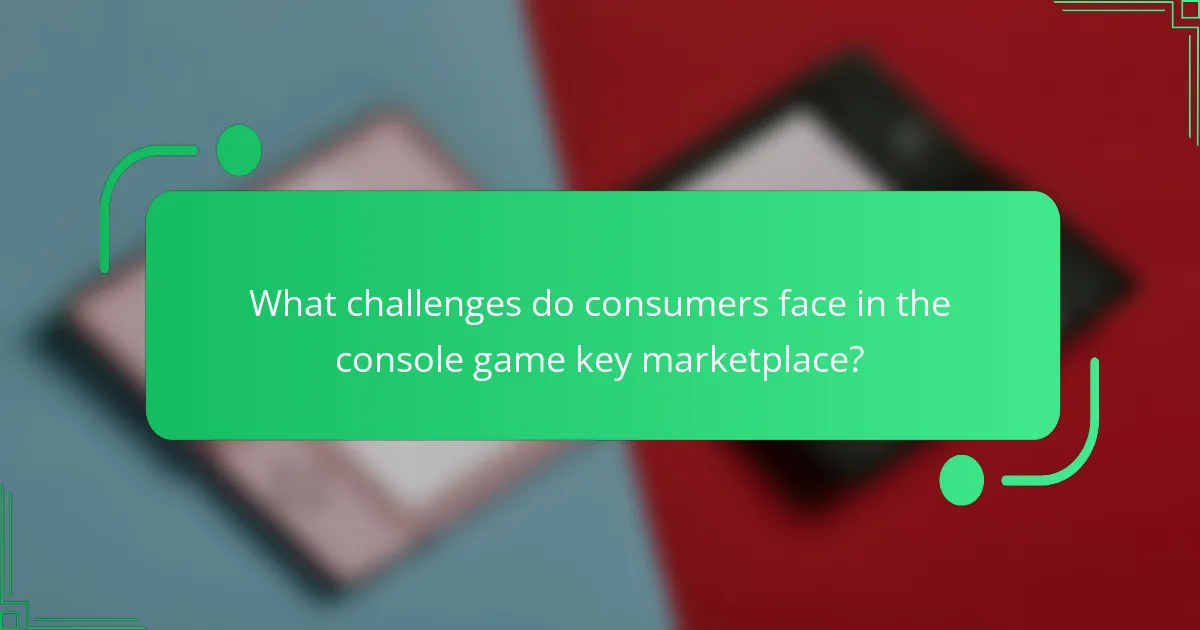
What challenges do consumers face in the console game key marketplace?
Consumers in the console game key marketplace face challenges such as fraud, lack of transparency, and limited customer support. These issues can lead to financial loss and dissatisfaction. Additionally, the presence of unauthorized sellers complicates trust, making it difficult for consumers to verify the legitimacy of their purchases. As a result, navigating this marketplace requires vigilance and caution.
How do counterfeit keys impact user experience?
Counterfeit keys significantly degrade user experience in the console game key marketplace. They lead to account bans, loss of purchased games, and decreased trust in legitimate sellers. Users may face frustration and financial loss, impacting their overall enjoyment of gaming. Counterfeit keys disrupt the marketplace’s integrity, making it vital for consumers to verify key authenticity.
What are the common security concerns?
Common security concerns in the console game key marketplace include fraud, account theft, and unauthorized transactions. Fraudulent sellers often exploit buyers, leading to financial losses. Account theft can occur through phishing attacks, compromising user credentials. Unauthorized transactions may arise from insecure payment methods, jeopardizing user data. These issues highlight the need for enhanced security measures and buyer awareness.
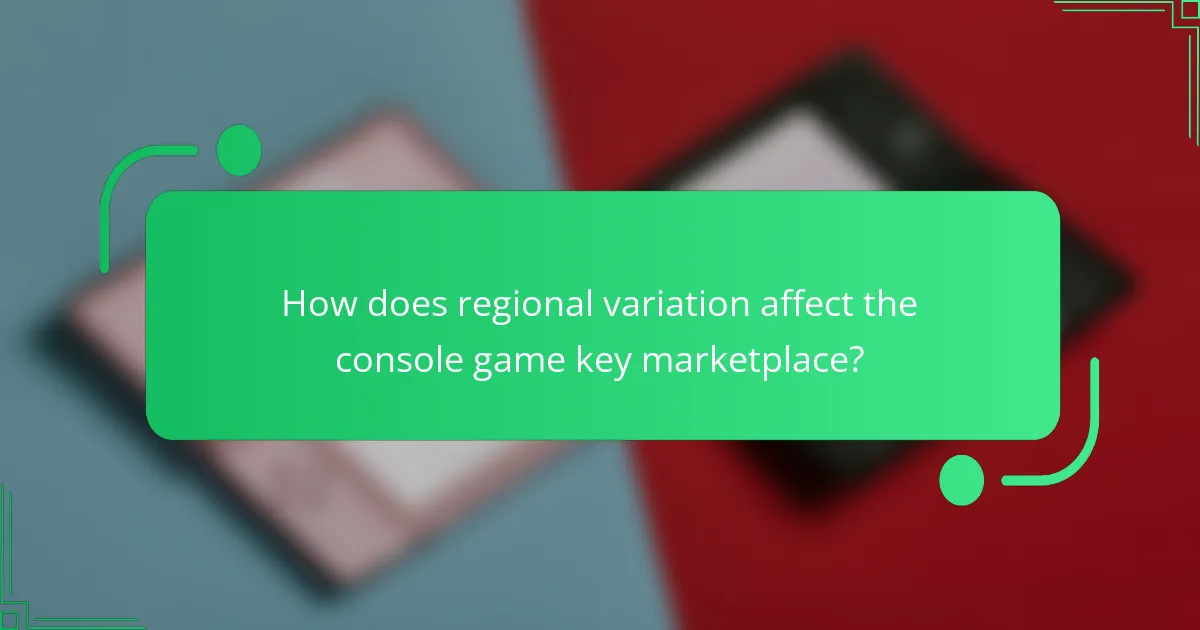
How does regional variation affect the console game key marketplace?
Regional variation significantly impacts the console game key marketplace by influencing pricing, availability, and consumer behavior. Different regions exhibit varying demand levels and purchasing power, which can lead to price discrepancies. For example, regions with higher disposable income may see higher prices for game keys, while less affluent areas might have lower prices to attract buyers. Additionally, local regulations and currency fluctuations can affect how keys are marketed and sold. As a result, understanding these regional dynamics is crucial for key distributors and retailers aiming to optimize their strategies.
Which regions show the highest demand for game keys?
North America and Europe show the highest demand for game keys. These regions account for significant sales due to a large gaming population and established digital marketplaces. In North America, the demand is driven by popular consoles and a strong online gaming culture. Europe follows closely, with countries like the UK, Germany, and France leading in sales. Emerging markets in Asia are also gaining traction, indicating a shift in global demand dynamics.
What unique buying behaviors are observed in different markets?
Unique buying behaviors in different markets reflect regional preferences and cultural influences. In the console game key marketplace, consumers in North America prioritize instant access and digital convenience, while European buyers often seek competitive pricing and bundle deals. Asian markets show a strong inclination towards mobile integration and community-driven purchases, emphasizing social aspects. Understanding these behaviors can guide strategic marketing efforts and product offerings tailored to each region’s unique demands.
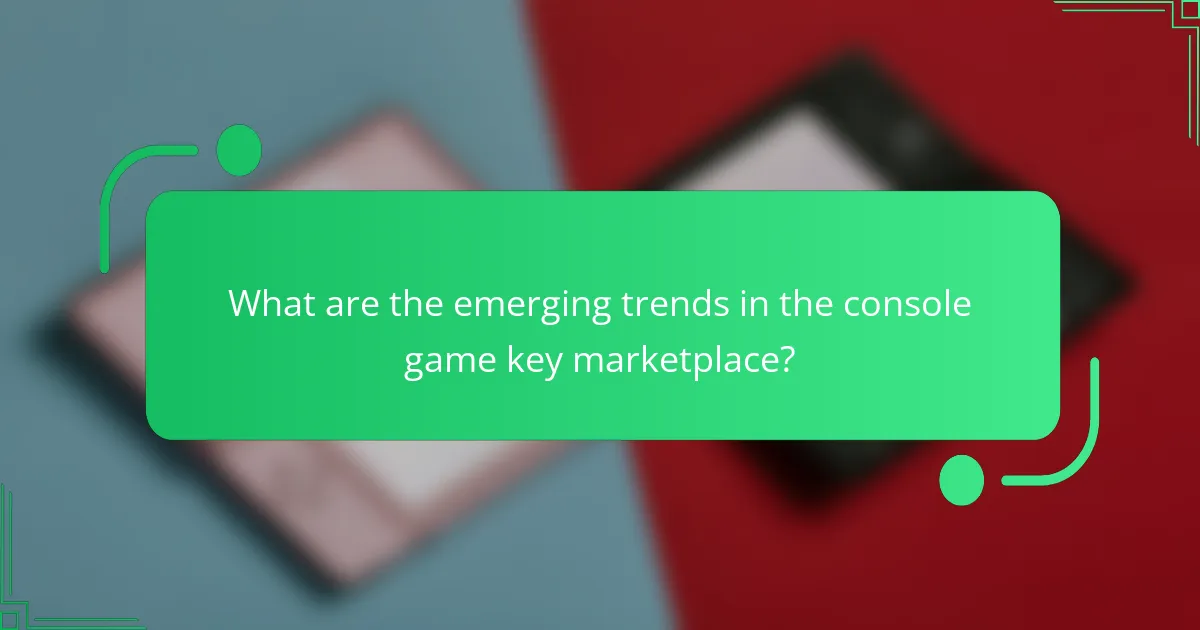
What are the emerging trends in the console game key marketplace?
The console game key marketplace is experiencing significant trends driven by digital transformation and consumer preferences. Key trends include the rise of subscription services, increased demand for digital ownership, and the growing importance of user reviews and community feedback. Subscription services like Xbox Game Pass are reshaping purchasing behavior, allowing gamers to access a library of games for a fixed fee. Digital ownership is becoming a priority, with players seeking more control over their purchases. Additionally, user reviews significantly influence buying decisions, highlighting the importance of community engagement in this evolving marketplace.
How is technology influencing the evolution of the marketplace?
Technology is transforming the console game key marketplace by enhancing accessibility and streamlining transactions. Digital platforms enable instant access to game keys, reducing the need for physical distribution. Key players like Steam and Epic Games leverage advanced algorithms for personalized recommendations, improving user engagement. Future predictions suggest a rise in blockchain technology for secure transactions, enhancing trust in the marketplace. Additionally, artificial intelligence will optimize inventory management and pricing strategies, creating a more efficient ecosystem.
What predictions can be made for the future of game key sales?
The future of game key sales is likely to see increased competition and innovative distribution models. As digital sales dominate, platforms may adopt subscription services and bundle offerings to attract users. The rise of cloud gaming could further transform how keys are sold and utilized. Enhanced security measures and anti-piracy technologies will also shape the marketplace, ensuring safer transactions for consumers.
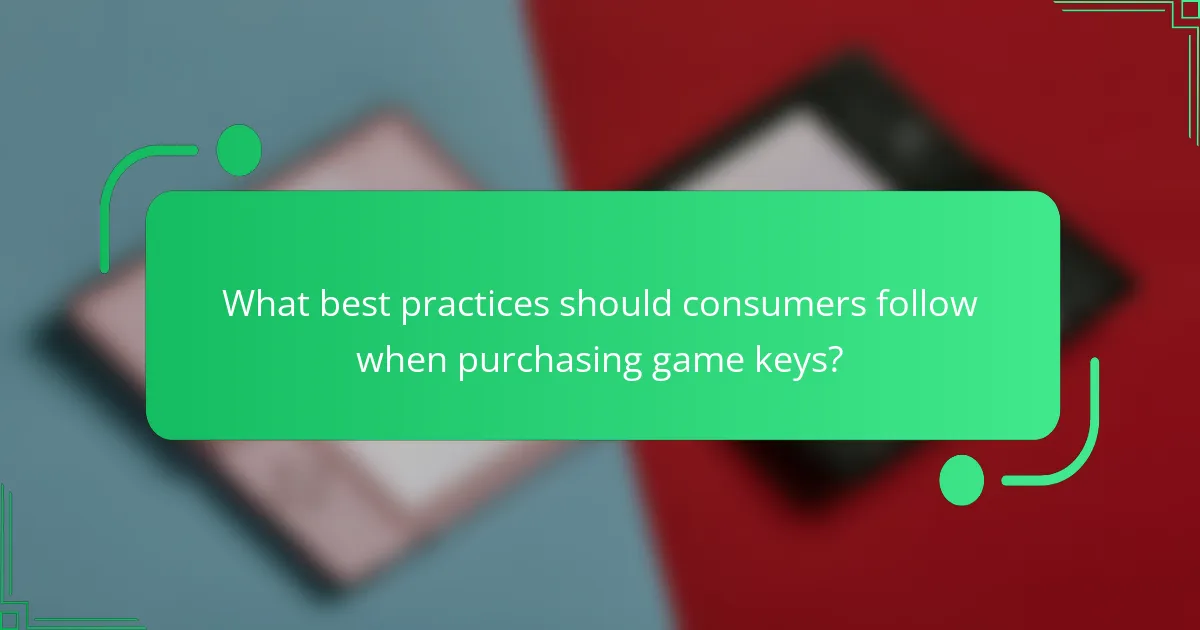
What best practices should consumers follow when purchasing game keys?
Consumers should verify the legitimacy of the marketplace, compare prices, and check user reviews when purchasing game keys. Ensure the key is compatible with your console and consider the return policy. Research the key’s origin to avoid counterfeit issues. Utilize trusted platforms with a good reputation for security and customer support.
How can buyers ensure they are getting legitimate keys?
Buyers can ensure they are getting legitimate keys by purchasing from reputable marketplaces and verifying seller ratings. Research the marketplace’s policies on refunds and customer support. Look for secure payment options and avoid deals that seem too good to be true. Checking for user reviews and community feedback can also provide insights into the marketplace’s reliability.
What common mistakes should consumers avoid in the marketplace?
Consumers should avoid common mistakes like purchasing from unverified sellers, ignoring user reviews, and neglecting to check regional restrictions. These errors can lead to wasted money and invalid game keys. Always verify seller credibility and understand the marketplace terms before buying.

